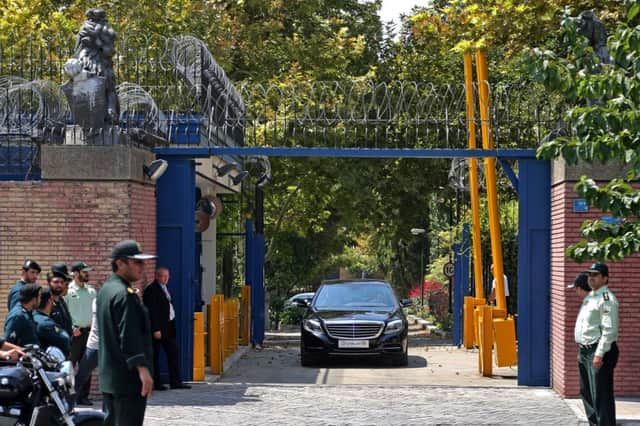Embassy reopens as Iran becomes ally in IS fight


During a ceremony at the building in Tehran, Philip Hammond said the move would build trust between the two nations and insisted there should be “no limit” to what could be achieved in the future.
Britain has had no diplomatic presence in Tehran since a mob ransacked the British embassy in 2011.
Advertisement
Hide AdAdvertisement
Hide AdThe attack was a “low point” in relations but the election of Hassan Rouhani as president has seen links improve “step by step”, Mr Hammond said.
In a ceremony yesterday at the embassy, where the union flag was raised, Mr Hammond said: “Today’s ceremony marks the end of one long journey and the start of a new and, I believe, exciting one.”
Plans to reopen the embassy were announced by the government last year as relations between London and Tehran improved under President Rouhani and Iran’s strategic position came under the international spotlight as the crisis sparked by Islamic State (IS), also known as Isil, grew in neighbouring Iraq.
Last month Iran struck a deal after a decade of negotiations with world powers over its nuclear programme, with some sanctions being lifted in return for allowing inspections.
The Foreign Office later eased its advice against travelling to Iran, saying the risk faced by British nationals had changed in parts of the country.
Mr Hammond said Iran was an “important” country in a volatile region and the embassy would play a vital role in improving relations.
Tackling IS as well as improving regional stability and dealing with migration are challenges that must be faced together, the Foreign Secretary said.
He added: “Last autumn, Prime Minister David Cameron met President Rouhani in New York, the first meeting at that level since 1979 between the leaders of our countries.
Advertisement
Hide AdAdvertisement
Hide Ad“Last month’s historic nuclear agreement was another milestone, and showed the power of diplomacy, conducted in an atmosphere of mutual respect, to solve shared challenges.
“Reopening the embassy is the logical next step to build confidence and trust between two great nations.
“Iran is, and will remain, an important country in a strategically important but volatile region. Maintaining dialogue around the world, even under difficult conditions, is critical. And embassies are the primary means of achieving this.
“Over the coming months, we will work to ensure that the nuclear agreement is a success, including by making sure that it is fully implemented by all sides, and through this embassy’s efforts we will support British trade and investment, once sanctions are lifted. That will bring benefits for Britain and the Iranian people.
“And we must go on to tackle the common challenges we face together: terrorism, regional stability, the spread of Isil in Syria and Iraq, trade in illegal narcotics and migration.
“We will not always agree. But as confidence and trust grows there should be no limit to what, over time, we can achieve together and no limit to our ability to discuss these issues together.”
Mr Hammond is the first British foreign secretary to visit Tehran since 2003 and only the third UK minister to visit since the 1979 revolution.
Initially, the embassy, which Britain acquired in 1869 for £8,000, will be headed by a charge d’affaires, Ajay Sharma, but Mr Hammond said an agreement on upgrading to full ambassador status is expected to be reached in the coming months. Iran’s embassy in London is also reopening.
Advertisement
Hide AdAdvertisement
Hide AdThe easing of sanctions will open up significant international trade opportunities and Mr Hammond has travelled to Tehran with a small trade delegation, including representatives from the Institute of Directors, British Bankers’ Association, Shell Upstream International and the Weir Group.